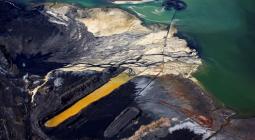Groundwater: Nitrate pollution will continue to be an issue across generations.

For years, the EU Commission has warned Germany about illegally high levels of nitrate in groundwater. The European Court of Justice even ruled on the issue in June. Now, the German government is working on a new Fertiliser Regulation. However, the groundwater is expected to remain contaminated for many more years. EURACTIV Germany reports.
Clean groundwater is an invaluable commodity, as it covers close to 70% of our drinking water. Germany’s groundwater has been evaluated as being poor for many years because it contains too much nitrate.
The reason for this is that agricultural fertilisation is being administered via liquid manure – the nitrate can only be taken off the ground for a limited amount of time, the rest seeps into the groundwater. Even the German Environment Ministry could not confirm any improvement of the situation in its 2016 Nitrate Report.
Compared to 2011 measurements, the amount of unspoilt waters has “barely risen”, although a significant improvement has been predicted. Some 28% of the measurement points exceeded the maximum permissible nitrate level.
‘As if Commission intentionally let us drive full throttle against a wall’
After many years of warnings, the Commission launched its case against Germany in 2016. In June last year, the European Court of Justice (ECJ) agreed with the Commission: Germany infringed the EU’s Nitrates Directive and should have adopted stronger measures a long time ago to protect its waters.
It is possible that a fine will need to be paid. A similar judgment was made against France in 2014.
Even the newly drafted 2017 Fertiliser Regulation, under which farmers, for instance, need to keep a record of the levels of liquid manure that fall onto the fields, is deemed to be insufficiently ambitious by the Commission.
It causes a lack of understanding among farmers: “The Commission writes with a high level of detail when commenting on the Fertilisation Regulation,” the farmer’s association chief Bernhard Krüsken told EURACTIV.
“The crazy thing is that the Commission was informed about the process this whole time. It knew all drafts of the Fertilisation Regulation. Yet, it waited until the Regulation was adopted in order to reinforce its old infringement procedure. This gives the impression that it was intentional in letting the process drive full throttle against a wall,” Krüsken said.
The Commission disapproves of the voluntary measures provided for in the regulations that federal states can initiate in their nitrate-contaminated areas. Pure voluntariness is too lax, according to Brussels.
The Commission requests a blanket 20% reduction of fertilisation needs. There is a dispute regarding the so-called “control value”, which marks a target corridor for calculating the need for fertiliser. “I am under the impression that the Commission has not understood what a control value is,” Krüsken added.
Plant types are dying out due to very high levels of nitrate
That farming does not function without the generation of nitrate is not up for debate as it is the basis for any crop growth. Without the necessary fertilisation, the world’s population could not be fed and not meet its dietary needs. “The problem of nitrate pollution arises mainly in livestock farming.
We have an excess of liquid manure, which farmers need to dispose of on their fields” explained Laura von Vitorelli, head of water policy at BUND (the German union for environment and conservation).
Nitrate in groundwater is only damaging to humans under certain circumstances. For instance, infants can develop oxygen depletion as a result of high nitrate levels in groundwater. It is very different for underwater plants.
Nitrate increases the nutritional values in water and allows for algae and other plants to grow, while others die out. “We have an alarming decline of water biodiversity” warned von Vittorelli.
Decade-old existence of nitrate in waters
Although the agricultural sector has attempted to reduce fertilisation in the past years, the new Fertilisation Regulation is unlikely to lead to any improvements. This is according to a study drafted by one of the BUND’s water researchers that was published in February.
The German Energy and Water Association found that the new regulation in its current form “does not lead to any considerable reduction of the over-fertilisation of nitrate.”
This is also due to the fact that groundwater only regenerates at a very slow pace. “Nitrate pollution will continue to be a problem for many generations,” according to von Vitorelli.
Krüsken from the DBV also sees it that way. There continues to be far too much nitrate in the ground from previous years, since the old Fertilisation Regulation gave authorities a very limited number of means to control and intervene in cases of nitrate pollution.
Under the pressure of the European Commission, the Federal Ministry for the Environment is working on a new regulation, which is meant to satisfy the EU’s requirements. By autumn, a draft is supposed to be sent to Brussels and should be adopted by the German cabinet in February 2020 at the latest.
Krüsken is rather sceptical: With other member states, the Commission has shown more patience to verify the effectiveness of adopted measures. Also, the fertilisation law has not been consistently transcribed in this regard, without the occurrence of such a visible outcry as has been the case in Germany.
“We are convinced that double standards are being applied in Europe,” he said.
26 March 2019








